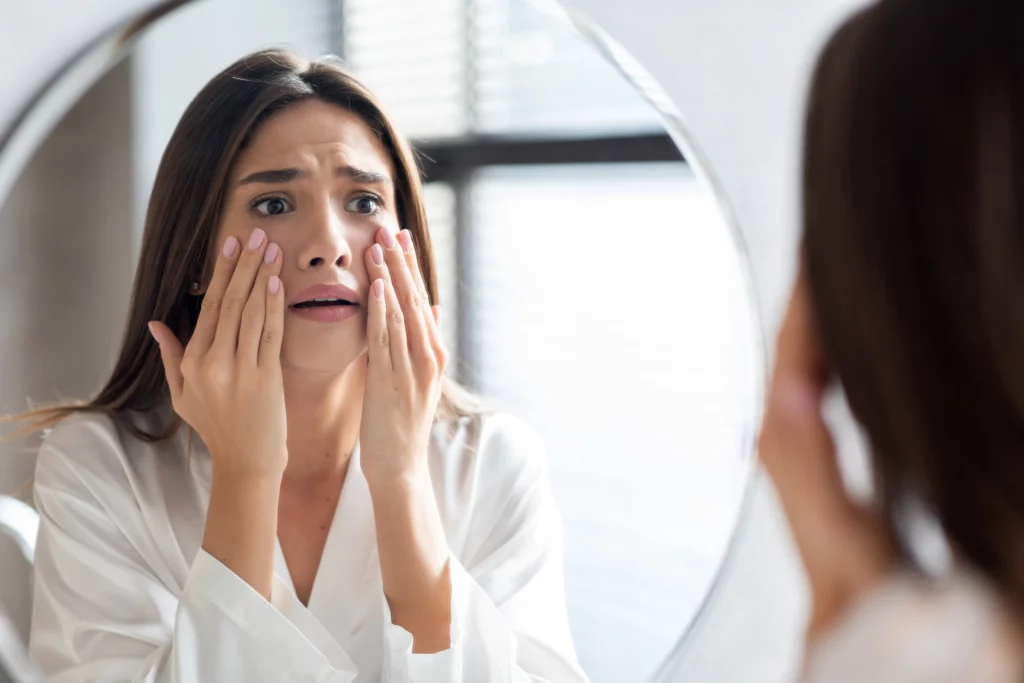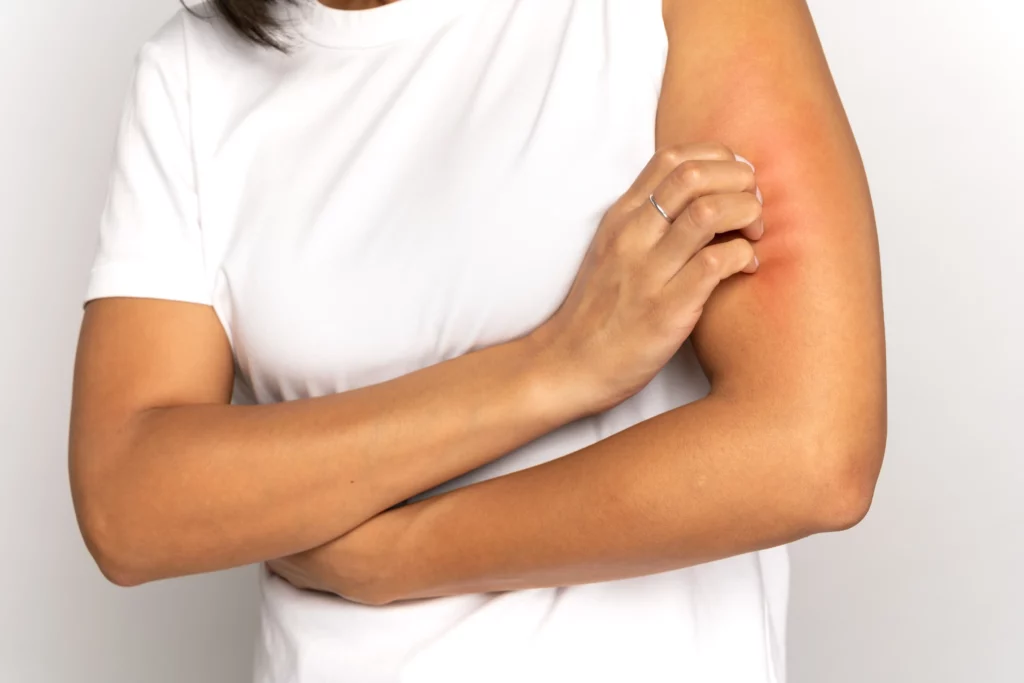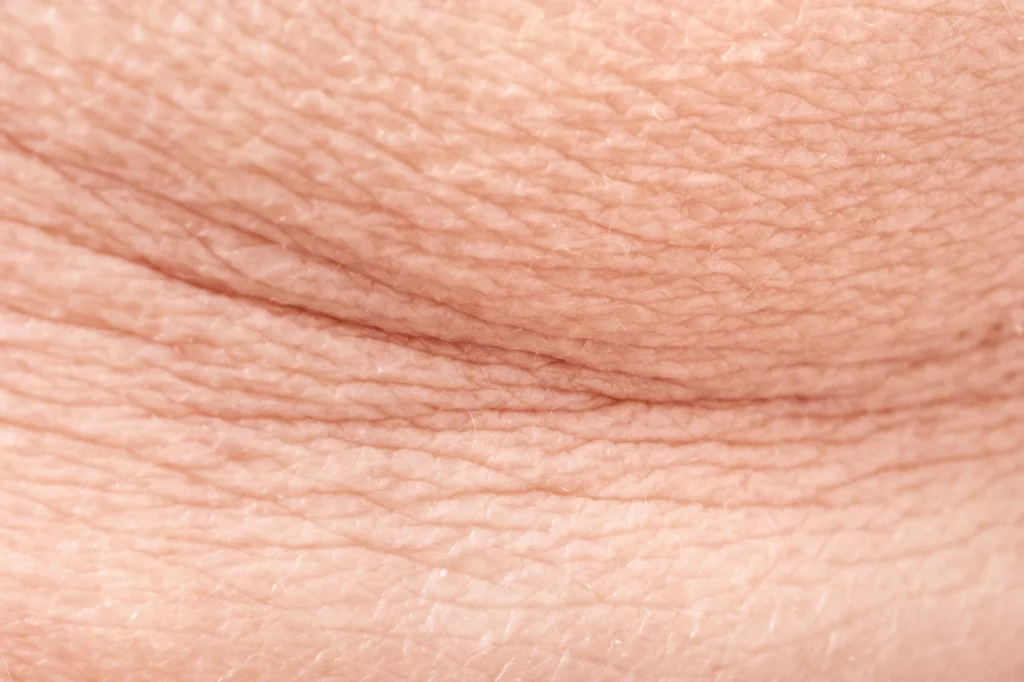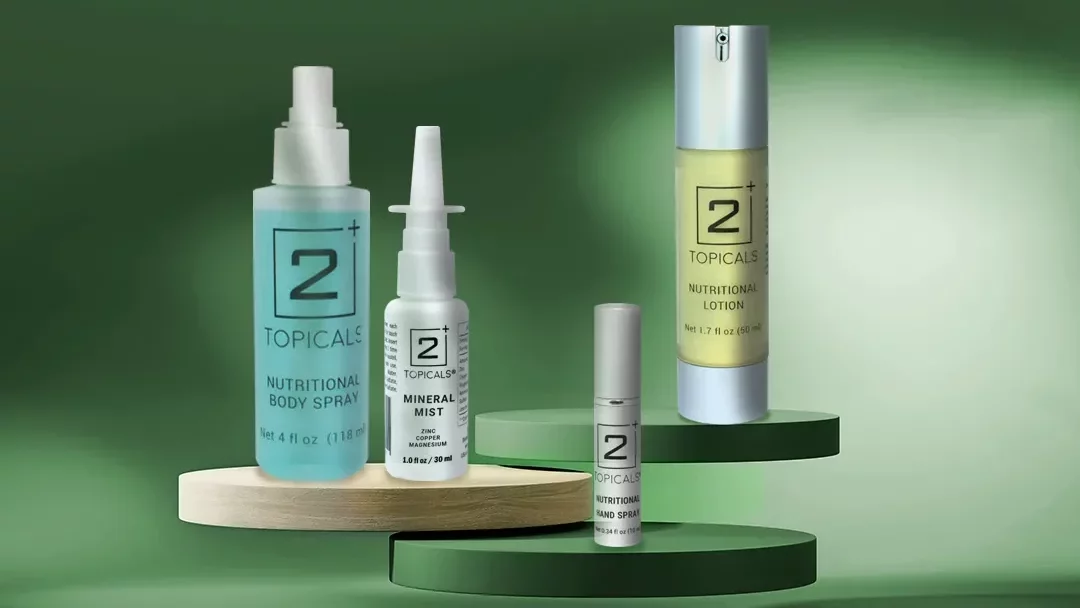Feeling like a rose wilting that is losing its charm? Ever so often, doesn’t your skin lack something? Merge into this reading session where discussions of dehydration signs in skin are laid for better comprehension, to find solutions, and to bring light to your skin again.
If you are witnessing dry, itchy, dull, or uneven overall tone or complexion, with noticeable fine lines, dehydrated skin might be the cause. Dehydrated skin may appear dry but should not be confused with having a dry skin type. Let’s unbox this topic.

You are born with a skin type, but two variants influence it: age or season. Classification of skin types is in the following categories:
Normal Skin: Normal skin has a balance of oil and water, appearing neither overly dry nor overly oily. It is often soft, supple, and smooth.
Combination Skin: A combination skin is when you have different areas of the face that are either dry or oily. The T-zone (forehead, nose, and chin) tends to be greasy, while the cheeks may be drier than other parts of your face.
Oily Skin: Relates to an excess of oil in the pores. It may appear shiny and feel oily, with enlarged pores and blackheads.
Dry Skin: Dry skin lacks oil and hydration and tends to be tight, flaky, and dull. It is prone to irritation, redness, and sensitivity.
Sensitive Skin: Sensitive skin is more easily affected by environmental factors and can be prone to redness, irritation, and itchiness. It may require gentle skincare products and needs extra protection from the sun.
Aging Skin: Aging skin tends to be dryer than other skin types due to natural aging. It may appear thin and fragile with wrinkles and age spots.
Now that skin types have been defined, understand that dehydrated skin is not the same as dry skin. Dry skin is a type, while dehydrated skin is a condition. It's a manageable condition. So fear not! Continue reading to do your part.
Dehydrated skin often gets overlooked by dry skin. Remember, a condition, not a type of skin. To further illustrate the dissimilarity, dehydration is a lack of water - in the body - and dry skin lacks natural oil - sebum. There are signs you can examine on your skin to determine the problem.
Dry skin signs:
Skin diseases such as psoriasis and eczema are sometimes associated with dry skin. Neither is the same as dry or dehydrated skin.
Skin signs of dehydration:
Dehydrated skin can also be more prone to sensitivity and breakouts due to lack of hydration. A thing to know is that dehydration means that your body loses more water than it takes in. Since it affects the body, severe dehydration is another level of concern.

Are you feeling some of these?
A doctor’s appointment should be underway.
Back to moderate dehydration, besides the visible signs, you can do a simple test on a portion of your skin to inspect. Pinch a part of your skin and release it. If the skin immediately snaps back into place, it is a good indicator that you have hydrated skin.
On the contrary, if there is a delay in the skin snapping back or it remains wrinkled, this could further denote that your skin is dehydrated. Professional help from dermatologists or aestheticians will help to determine effectively if your skin is dehydrated or dry.
Dehydrated skin is a common problem caused when the skin lacks the appropriate level of moisture. It can be due to several factors, including environmental conditions, lifestyle habits, and even certain skincare products.
The most common cause is exposure to extreme weather conditions. Low humidity, strong wind, and extreme temperatures can all strip the skin of its natural moisture, leaving it feeling dry and tight.
Another typical cause of dehydrated skin is lifestyle habits such as drinking insufficient water, smoking cigarettes, or using harsh skincare products that contain irritating ingredients such as alcohol or sulfates. These products can further break down the skin of natural moisture, leading to more dehydration.
Acting on the necessary steps to identify and treat dehydrated skin will help restore its hydration and keep it looking healthy, radiant, and youthful!

Dehydrated skin can be frustrating, particularly when it’s not managed. However, this isn’t an impossible task; there are several ways to treat it and help restore its natural radiance and suppleness.
Once the root cause is determined, there are several methods to help combat dehydration and restore hydration to the skin:
If symptoms persist despite prevention measures, consulting with a dermatologist may be necessary to find the best treatment plan for you.
By understanding how to identify signs of dehydrated skin, you can take steps to prevent it from happening and restore moisture levels if necessary.
Drinking plenty of water throughout the day, avoiding harsh skincare products, using moisturizers regularly, and wearing protective clothing in extreme weather conditions can aid in conserving the skin hydrated and healthy.
An appropriate skincare routine and lifestyle habits can protect your skin against dehydration so that it remains healthy and beautiful!
Consult your dermatologist if you need additional advice or specific treatments for severe cases of dehydration.
No one wants dull-looking skin. Fortunately, 2+ Topicals® offers a range of products specifically designed to nourish your skin while providing long-lasting hydration. With the right combination of the highest natural ingredients in each product, you'll be able to keep your skin looking healthy and glowing for years to come!

Give yourself the gift of beautiful, hydrated skin today!